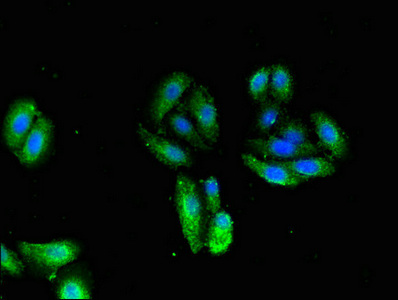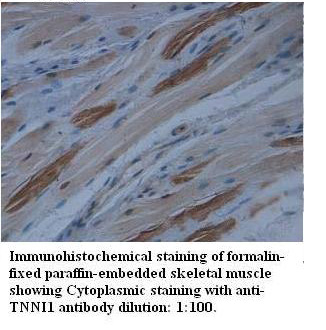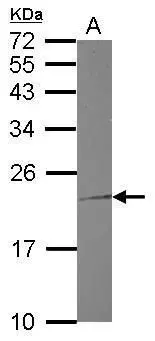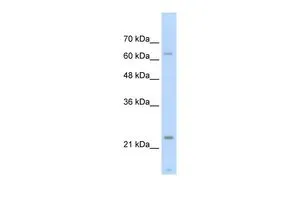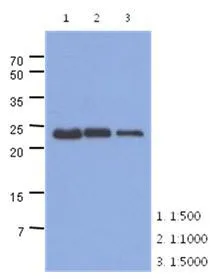
WB analysis of mouse muscle lysate (40ug) using TNNI1 antibody at the indicated dilutions.
TNNI1 antibody [AT36E7]
GTX53792
ApplicationsWestern Blot, ELISA
Product group Antibodies
ReactivityHuman, Mouse
TargetTNNI1
Overview
- SupplierGeneTex
- Product NameTNNI1 antibody [AT36E7]
- Delivery Days Customer9
- Application Supplier NoteThe antibody has been tested by ELISA and Western blot analysis to assure specificity and reactivity. Since application varies, however, each investigation should be titrated by the reagent to obtain optimal results. Recommended dilution range for Western blot analysis is 1:500 ~ 1:5000. Recommended starting dilution is 1:5000.
- ApplicationsWestern Blot, ELISA
- CertificationResearch Use Only
- ClonalityMonoclonal
- Clone IDAT36E7
- Concentration1 mg/ml
- ConjugateUnconjugated
- Gene ID7135
- Target nameTNNI1
- Target descriptiontroponin I1, slow skeletal type
- Target synonymsSSTNI, TNN1, troponin I, slow skeletal muscle, troponin I type 1 (skeletal, slow)
- HostMouse
- IsotypeIgG2b
- Protein IDP19237
- Protein NameTroponin I, slow skeletal muscle
- Scientific DescriptionTroponin proteins associate with tropomyosin and regulate the calcium sensitivity of the myofibril contractile apparatus of striated muscles. Troponin I (TnI), along with troponin T (TnT) and troponin C (TnC), is one of 3 subunits that form the troponin complex of the thin filaments of striated muscle. TnI is the inhibitory subunit; blocking actin-myosin interactions and thereby mediating striated muscle relaxation. The TnI subfamily contains three genes: TnI-skeletal-fast-twitch, TnI-skeletal-slow-twitch, and TnI-cardiac. The TnI-fast and TnI-slow genes are expressed in fast-twitch and slow-twitch skeletal muscle fibers, respectively, while the TnI-cardiac gene is expressed exclusively in cardiac muscle tissue. This gene encodes the Troponin-I-skeletal-slow-twitch protein. This gene is expressed in cardiac and skeletal muscle during early development but is restricted to slow-twitch skeletal muscle fibers in adults. The encoded protein prevents muscle contraction by inhibiting calcium-mediated conformational changes in actin-myosin complexes. [provided by RefSeq, Jul 2008]
- ReactivityHuman, Mouse
- Storage Instruction-20°C or -80°C,2°C to 8°C
- UNSPSC41116161

